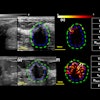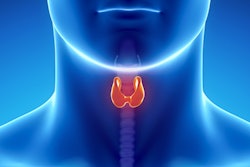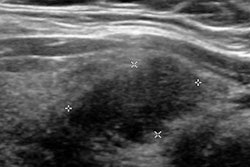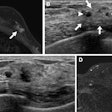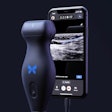Certain ultrasound characteristics can help clinicians identify malignant thyroid nodules in children, according to a study published online May 1 in Radiology.
A team led by Dr. Danielle Richman of Brigham and Women's Hospital used data from 404 thyroid nodules in 314 patients (age range: 2-18 years) between January 2004 and July 2017. All nodules received ultrasound-guided fine-needle biopsy; the researchers recorded age, sex, background appearance of the thyroid gland for each patient, sonographic characteristics, and pathologic diagnosis for each nodule.
Of all the nodules, 77 (19.1%) were malignant, and most of these were papillary thyroid carcinoma (88.3%). The likelihood of malignancy did not differ by patient sex or puberty status, Richman and colleagues found. The cancer rate in children with a solitary nodule was higher than in those with multiple nodules (29.4% versus 14.2%, p = 0.003).
The researchers also identified a number of sonographic characteristics associated with malignant nodules, such as larger size, solid parenchyma, taller-than-wide shape, presence of speckled calcifications, lack of a smooth margin, and presence of abnormal lymph nodes.
"In children with thyroid nodules ... [these characteristics] raise concern for malignancy," they concluded.



